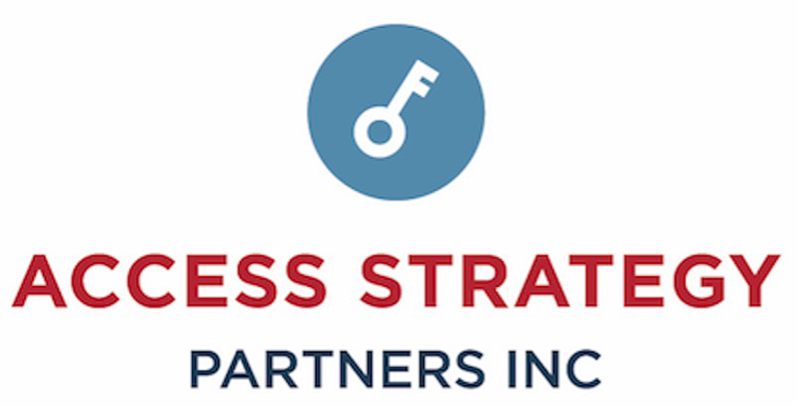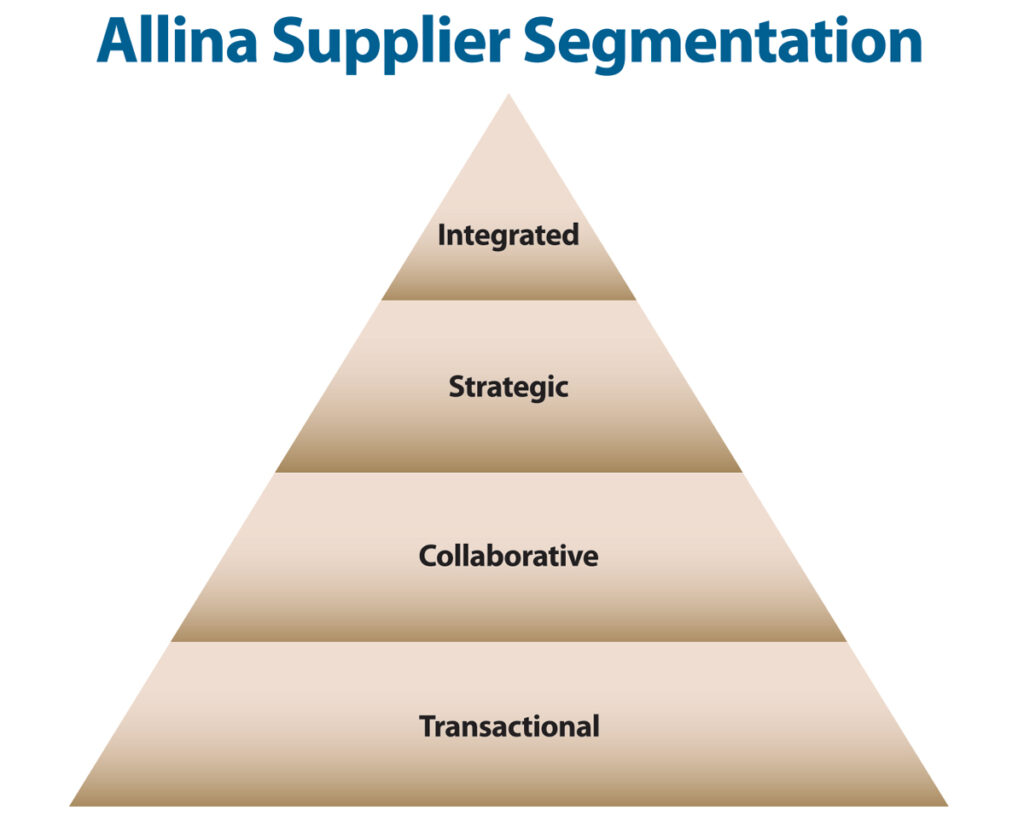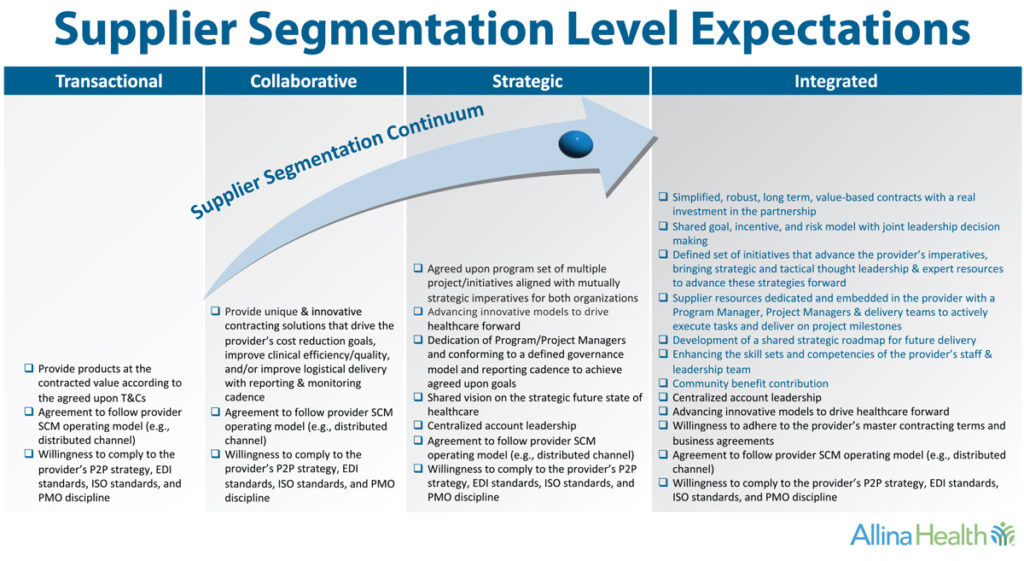How a supplier segmentation strategy creates the platform for successful relationships and collaborations.
BY TOM LUBOTSKY AND DENNIS ORTHMAN
December 2022 – The Journal of Healthcare Contracting


While there is much industry emphasis on the value of collaboration between providers and suppliers, tangible value and benefit from collaborations are already being realized today at Allina Health with help from a segmentation approach that centers on how best to manage these relationships.
The challenge
For the last few decades, the powers of “company to company” strategic relationships in all industries have been well documented and written about in many publications. Long embraced by suppliers in major markets, strategic relationship development or customer relationship management (CRM) programs are often started by companies with the use of “customer segmentation” models that organize key customers into groups or segments. Suppliers can then develop targeted programs and strategies that seek – for each segment of customers – to:
- Learn about their customers on a deeper level
- Tailor their content to the unique needs/challenges of each customer segment
- Create targeted messaging that will resonate with each segment
- Improve their customer service, loyalty, and support efforts
- Find new opportunities for sales and products
The Harvard Business Review has published extensively on this topic, including a 2008 article by Vantage Partners entitled “From Vendor to Partner: Why and How Leading Companies Collaborate with Suppliers for Competitive Advantage.” The article explains the emerging concepts involved with supplier relationship management (SRM) – including the segmentation of suppliers into categories that foster better tracking, analyzing, and utilization of each supplier, based on value, capabilities, and contributions. So, while “customer segmentation” has long been practiced by healthcare suppliers, the similar practice of “supplier segmentation” is currently being embraced by select healthcare provider organizations with advanced chief supply chain officers.
Allina Health, a not-for-profit health care system that serves more than 16.7 million people in Minnesota and western Wisconsin through operating 12 hospitals and more than 100 specialty care sites, has a maturing corporate supply chain program that recognizes that health systems simply do not have the resources to drive maximum value by themselves. “Competitive pricing and good products are important, but they are not enough in serving today’s competitive market,” says Tom Lubotsky, Allina’s Vice President of Supply Chain. “Healthcare systems today have to be more demanding than ever of themselves and their suppliers. We must all raise the bar.”

A leading example
Tom and his leadership team at Allina Supply Chain work every day to “raise the bar” and change the culture about working collaborations with suppliers. One of their many initiatives has been building the foundations for a well-defined supplier relationship management (SRM) program. That SRM program uses a well-defined Allina Supplier Segmentation Strategy. This foundational strategy specifies four (4) levels of supplier segmentation, each level based on a supplier’s level of integration into Allina’s success. Specifically, each level is defined:
Integrated Supplier
Suppliers who have made the full commitment of resources and capabilities embedded into Allina’s actual operations sustained by a defined shared governance model. Integration is characterized by a direct shared risk/reward model and investment toward meeting the shared vision and value proposition for the combined organizations.
Strategic Supplier
Suppliers providing a defined set of offerings and initiatives that collaborate directly with Allina to accomplish market-leading clinical safety, quality, service, and cost-reduction capabilities. There is a deliberate alignment of both organization’s strategic imperatives driven by a governance model.
Collaborative Supplier
Suppliers that provide a set of unique offerings (collaborative event(s)) to advance Allina’s strategic imperatives, including cost reduction goals, meeting their quality, safety, and care coordination goals.
Transactional Supplier
Suppliers that provide Allina with products and services based upon standard contracting terms and conditions.
Planning and implementing

The Allina Supplier Segmentation program has required significant efforts to gain a deliberate understanding of how each supplier currently provides its services within Allina Health. One goal of segmentation is to appropriately find the right relationship segment and success factors for working with a supplier. It should not necessarily be the goal of every supplier to ascend to the top of this relationship pyramid as an integrated supplier. As a supplier demonstrates success among a set of collaborative events or initiatives, they may be a candidate to consider moving into a strategic or integrated relationship. These relationship levels typically require additional resources, plus a diligent input and outreach effort by Allina Supply Chain leadership and each partner’s leadership to make sure all relevant parties are clear on the organizational requirements to play in these segments.
Proper planning to isolate key areas of advancing value to both parties is a strong prerequisite for success. As with most successful supplier/provider collaborative efforts, early senior executive ownership of any initiative by both Allina and its partner is critical, along with a strong, customized, unified communication approach. Initiative infrastructure is centered on a “one company one operating model” philosophy that includes documentation of a shared vision, focus on value, and joint scorecard. Named relationship owners from both companies operate within a program management model that requires resource commitment and the building of mutual trust.
The Allina program provides specific, measurable expectations for all its suppliers regardless of the segment they are in, as exemplified by the documented segmentation level expectations.
One notable example of the program in action is the Integrated Supplier business relationship between Allina Health and Medtronic. With 90+ clinical collaboration engagements and six process redesign and optimization projects completed to date, Allina and Medtronic have always approached their relationship with the objective of improving healthcare access and patient impact. The most recent examples that illustrate innovative collaboration took place at the onset of the COVID pandemic. Medtronic and Allina collaborated on emergency room COVID-19 patient flow preparedness. With heavy clinical involvement and administrative support, this particular collaboration operationalized the traffic control protocol in 18 Emergency Departments, 9 Med/Surg units, and 9 ICUs across five health systems in Minnesota within 30 days. Consequently, participating sites realized a reduced rate of nosocomial COVID-19 infections.
This COVID-19 project was among a series of Allina and Medtronic collaborative events that have demonstrated a working relationship of mutual value beyond traditional transactional provider-supplier engagements. With executive endorsement, both organizations have agreed to explore additional areas of expanded collaboration that could result in improved operational efficiencies and/or greater value to the shared communities and patients served. Dave Roberts, Medtronic Senior Vice President and President of the U.S. Market, has been a strong supporter of the collaborations. “Medtronic’s executive leaders and Allina’s executive leaders meet regularly to discuss strategic priorities, progress, and outcomes. This structure ensures accountability at the highest levels of both organizations.” This specific collaborative project has resulted in the Allina-Medtronic relationship to be awarded the inaugural Tom Hughes Collaboration Award by the SMI, a leading industry think tank. Tom Hughes was a long-recognized supply chain leader and tireless innovator, pioneer, and creator who was at the forefront of promoting the power of provider-supplier collaborations to create impactful and lasting positive change in the industry. The SMI Tom Hughes Collaboration Award has been established to recognize efforts that involve both supply chain trading partners successfully collaborating to bring innovation, discovery, and improvements to the healthcare supply chain.
